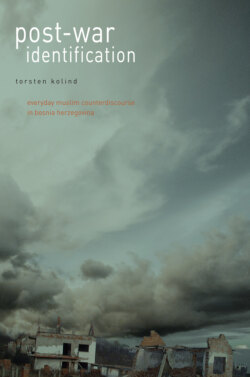Читать книгу Post-War Identification - Torsten Kolind - Страница 44
На сайте Литреса книга снята с продажи.
Amputation: we ate grass
ОглавлениеOften people said that they had to eat grass when living as refugees in Blagaj during the war. In 1993 and 1994 hardly any relief reached the area: the Muslim-controlled area around Blagaj was like a tongue of land, with only one unsafe entrance. People were hungry or even starving. But how does one communicate the feeling and experience of starvation? It does not suffice to say ‘we were starving’ or ‘starving to death’, or ‘we were extremely hungry’, though I have heard all these expressions. Then people summed up the experience in the sentence ‘we ate grass’. The expression ‘eating grass’ functioned as a symbol covering some of the feelings people had in relation to extreme starvation and fear. This symbolic expression could stand alone, without needing to be commented or elaborated on. Let me give two examples: One evening Nihad was jokingly talking about how they had made moonshine during the war, and we were all laughing at his story. Suddenly his wife said: “we had to eat grass.” Then the laughter stopped, and we were all silent for a couple of minutes. Then we started talking about something else.
Amer told a story he had probably heard from his wife:
The women went to the field to pick some grass, and they ate it. While they did this, the snipers were shooting at them. This was while we [the men] were in prison camp. Near the house where my mother lived, an old woman was out in the field, two times the snipers shot at her, they missed two times, but she did not hear, she was nearly dead. And then they shot her the third time. The women in the house were shouting at her to hide herself, but she did not hear, and then the third time they hit her. And all she did was to pick some grass from the field.
